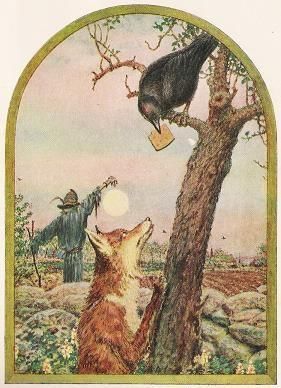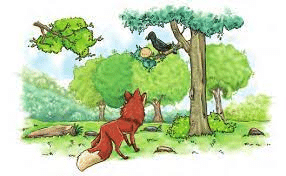|
The moral lesson of 'The Raven and the Fox' warns against the dangers of ___ and ___. |
Card: 1 / 34 |
|
True or False: The characters in La Fontaine's fables often exhibit human traits. |
Card: 3 / 34 |
|
The Fox flatters the Raven, complimenting his beauty and suggesting he should sing, which distracts the Raven and leads him to drop his food. |
Card: 12 / 34 |
|
The Raven believes he is special and sings, but what does this decision reveal about his character? |
Card: 13 / 34 |
|
The Raven's decision to sing despite knowing his voice isn't pleasant reveals his pride and inability to see through the Fox's flattery. |
Card: 14 / 34 |
|
False. The Fox is insincere and uses flattery to manipulate the Raven for his own gain.  |
Card: 16 / 34 |
|
Fill in the blank: The lesson learned by the Raven is that excessive ___ can lead to mistakes. |
Card: 17 / 34 |
 Unlock all Flashcards with EduRev Infinity Plan Starting from @ ₹99 only
|
|
What does the Fox say to the Raven at the end, and what lesson does it convey? |
Card: 19 / 34 |
|
The Fox tells the Raven to be cautious of sweet words that make him feel good, teaching that pride can lead to foolish mistakes. |
Card: 20 / 34 |
|
The Fox's laughter symbolizes his triumph over the Raven and highlights the lesson that pride can make one vulnerable to deception. |
Card: 24 / 34 |
|
The main theme is the danger of pride and the power of flattery, illustrating how pride can blind individuals to the intentions of others. |
Card: 26 / 34 |
|
The raven loses its food because it is too proud to ___ and instead wants to show off. |
Card: 27 / 34 |
|
True or False: The fox uses flattery to genuinely compliment the raven's appearance. |
Card: 29 / 34 |
|
The raven's pride leads it to neglect its food in favor of showing off, allowing the clever fox to take advantage of the situation. |
Card: 32 / 34 |
|
We should remain humble and cautious, as not everyone who offers compliments has good intentions. |
Card: 34 / 34 |





























